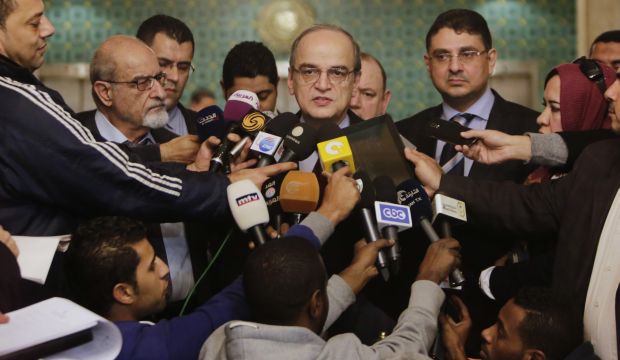
Hadi Bahra, the head of the Syrian National Coalition speaks during a press conference following his meeting with the Arab League’s Secretary-General Nabil Elaraby at the league’s headquarters in Cairo, Egypt, Saturday, Dec. 27, 2014. (AP Photo/Amr Nabil)
Moscow, Asharq Al-Awsat—Any talks between Assad regime officials and Syrian opposition figures in Moscow will be based on the Geneva Communique which calls for the establishment of a transitional governing body with full executive powers, a senior Russian diplomat told Asharq Al-Awsat.
The assurance comes after senior Syrian opposition figures said they would be unlikely to attend the preliminary peace talks, which the Assad regime had earlier dismissed as “preliminary consultations,” unless the discussions were based on the Geneva Communique issued following the Geneva I meeting in June 2012.
The senior Russian diplomat, speaking to Asharq Al-Awsat on the condition of anonymity, confirmed that at least 30 Syrian opposition figures have been invited to attend the talks later this month.
The talks would see opposition figures, based inside and outside Syria, meet in Moscow between January 26 and 28, with subsequent discussions to be held between Syrian opposition figures and government representatives on January 29, the last day of the talks.
The diplomat added that invitations have been sent to Syrian opposition figures on an individual basis, aside from any political affiliations. This includes invitations to two former leaders of the Western-backed Syrian National Coalition, Hadi Al-Bahra and Moaz Al-Khatib.
However members of the Syrian National Coalition previously informed Asharq Al-Awsat that officials from within the group are unlikely to attend as independents, as this would detract from the coalition’s legitimacy and prestige.
Head of the Paris-based National Coordination Committee Haytham Manaa, former academic and economist Aref Dalila, prominent Syrian-based human rights lawyer Anwar Al-Bunni and former Syrian foreign ministry spokesman Jihad Al-Makdissi have also been invited to attend the Moscow talks.
“The list is by no means exhaustive and there is always the possibility of inviting more Syrian opposition figures,” the diplomat added.
According to the Russian diplomat, the talks will not have a specific agenda and will begin with a series of meetings conducted over three days between exiled opposition figures and those who chose to stay in the war-torn country as part of efforts to unify the Syrian opposition’s stance ahead of any meeting with Assad representatives.
While Russian officials will be present at both sets of talks, Moscow’s role will be limited to moderating discussions, the Russian diplomat said. He added that UN Envoy to Syria, Staffan de Mistura, will not attend the talks but hinted that his deputy, Ramzi Ezzeddine Ramzi, could.
Asked whether Assad’s departure, which has long been the Syrian opposition’s main pre-condition for attending any new peace talks, will be on the agenda, the Russian diplomat said that it is up to the participants to decide what will be discussed.
As for who will represent Assad at the talks, the Russian diplomat said that it is up to the Syrian president to decide this, but denied reports that Assad himself will attend the talks.
Talks between the Assad government and opposition have been fraught with difficulties and have stalled following the Geneva II talks in January last year.
